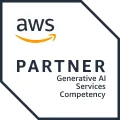Transitioning from Software Development to AI Engineering
TL'DR
- By 2027, 80% of engineers will need AI skills to stay competitive.
- Transitioning into AI engineering is both a career opportunity and a necessity for future-proofing.
- AI engineers blend software engineering, ML, and data science, enabling automation, predictive systems, and intelligent applications.
- High-demand roles include AI engineers, ML specialists, and data scientists, with top salaries exceeding $200K in the U.S.
- Software engineers can transition by mastering ML basics, neural networks, NLP, Python/TensorFlow, and building real-world portfolios.
- The future will bring new roles like prompt engineers, AI ethicists, and test architects making AI engineering central to innovation.
The tech world is evolving rapidly, with artificial intelligence (AI) at the forefront of this transformation. By 2027, 80% of the engineering workforce will need to upskill to remain competitive as AI becomes increasingly embedded in development processes. AI is reshaping the roles of software engineers, allowing them to focus on higher-value tasks and more creative aspects of software design.
So, why should software engineers consider transitioning into AI engineering? Simply put, AI is becoming a central element in modern software development. 56% of software engineering leaders have identified AI/ML engineering as their top priority in 2024-2025. This shift presents a unique opportunity for software engineers to pivot into AI roles and remain at the cutting edge of technology.
As Philip Walsh, Sr. Principal Analyst at Gartner, notes, "Building AI-empowered software will demand a new breed of software professional, the AI engineer." AI engineers are in high demand due to their ability to blend engineering, data science, and machine learning expertise. By transitioning into AI, engineers can enhance their careers and take on a critical role in shaping the future of software development.
This blog will explore why transitioning to AI engineering is a strategic move, the skills necessary for the shift, and how your role will evolve in AI-driven innovation.
Why Should Software Engineers Transition to AI and ML?
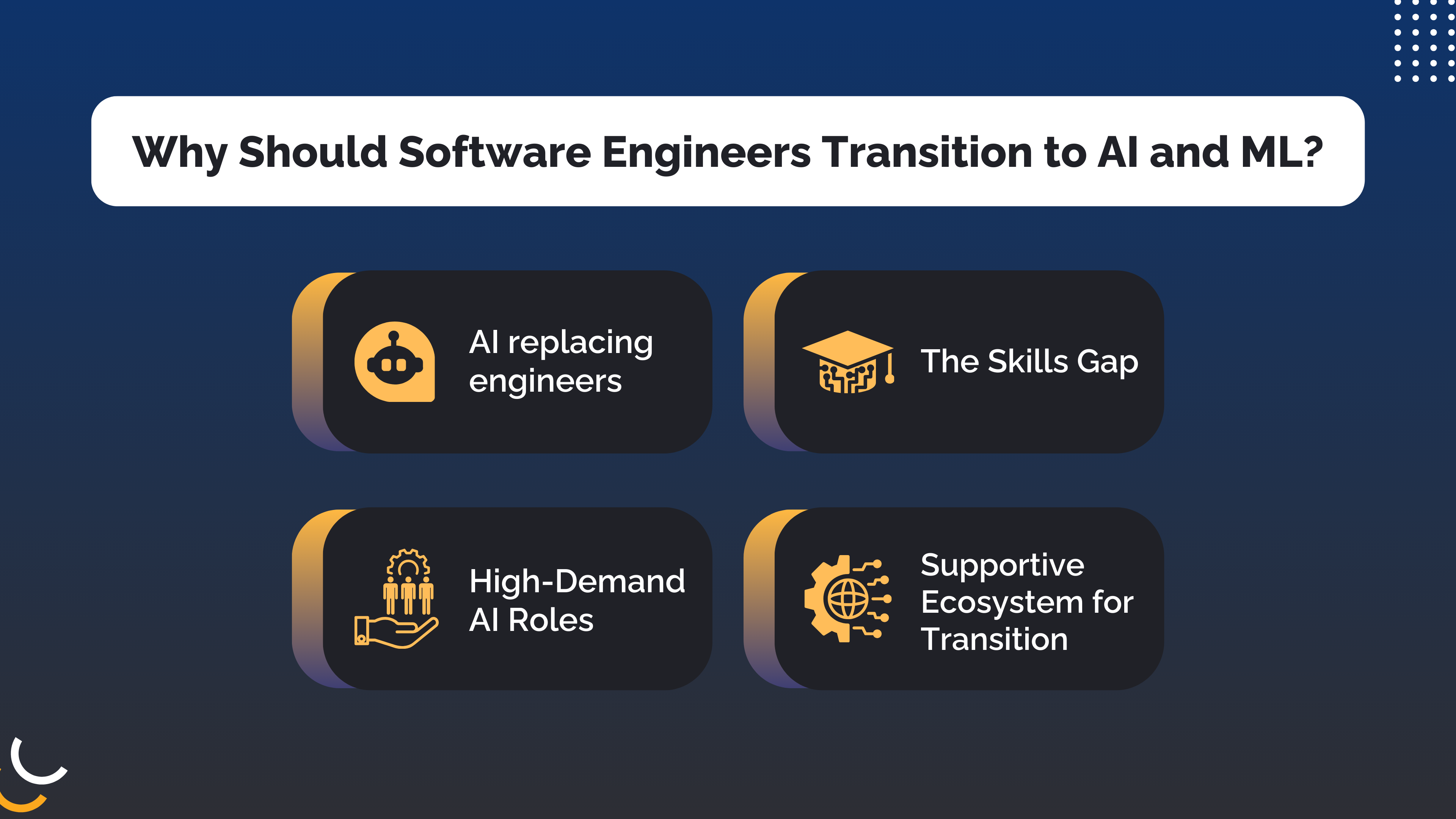
AI and Machine Learning (ML) are reshaping industries and creating high-demand roles for skilled professionals. For software engineers, transitioning to AI and ML isn’t just an upgrade; it’s a necessary step to stay competitive. Here’s why this shift is crucial.
Growing Concerns About AI Replacing Software Engineers
According to researchers at the US Department of Energy’s Oak Ridge National Laboratory, there’s a real possibility that AI could replace software developers as early as 2040. These experts predict that advancements in AI, machine learning, natural language processing, and code generation technologies will evolve to the point where machines will be capable of writing most of their code.
Software engineers are already feeling this shift. In a survey by Evans Data Corporation, nearly 30% of the 550 software developers polled expressed concerns that AI would replace their roles in the foreseeable future.
The Skills Gap
The skills gap in AI and ML is a pressing issue. While the demand for AI professionals continues to rise, the supply of skilled engineers is struggling to keep up.
By 2025, the integration of AutoML (automated machine learning) and pre-trained models will make it easier for software engineers to pivot into AI roles without extensive retraining. Tools like GPT-4, BERT, and TensorFlow will enable engineers to apply AI techniques in their work more efficiently and with less effort.
High-Demand AI Roles
As AI continues to permeate industries, the demand for professionals with AI expertise is growing rapidly. AI engineers, data scientists, and ML specialists are now among the most sought-after professionals in the tech industry. A recent report from Analytics Insight predicts that 97 million new AI-related jobs will be created globally by 2025.
AI and ML engineers are also among the highest-paid professionals in tech. In the U.S., salaries for these roles range from $135,116 to $165,922, with top-tier companies offering total compensation packages exceeding $212,479. By transitioning into AI, software engineers can capitalize on this growing demand, positioning themselves at the forefront of the industry.
Supportive Ecosystem for Transition
The ecosystem supporting professionals transitioning to Machine Learning (ML) has grown stronger, offering numerous resources for those looking to shift careers.
- Learning Resources: Platforms like Coursera, Udemy, and specialized ML boot camps offer affordable ways to gain ML expertise.
- Community Support: ML communities on GitHub, Kaggle, and Reddit provide collaborative environments for learning and project development.
- Recruitment Trends: Companies are more open to hiring professionals transitioning from other tech roles as long as they have the right skills and mindset.
Transitioning into AI and ML not only provides job security but also future-proofs your career. As AI’s role expands, let's take a closer look at how the demand for AI engineers is growing across different industries and why this is a prime opportunity for software engineers to move into this field.
How is AI engineering being applied across different industries?
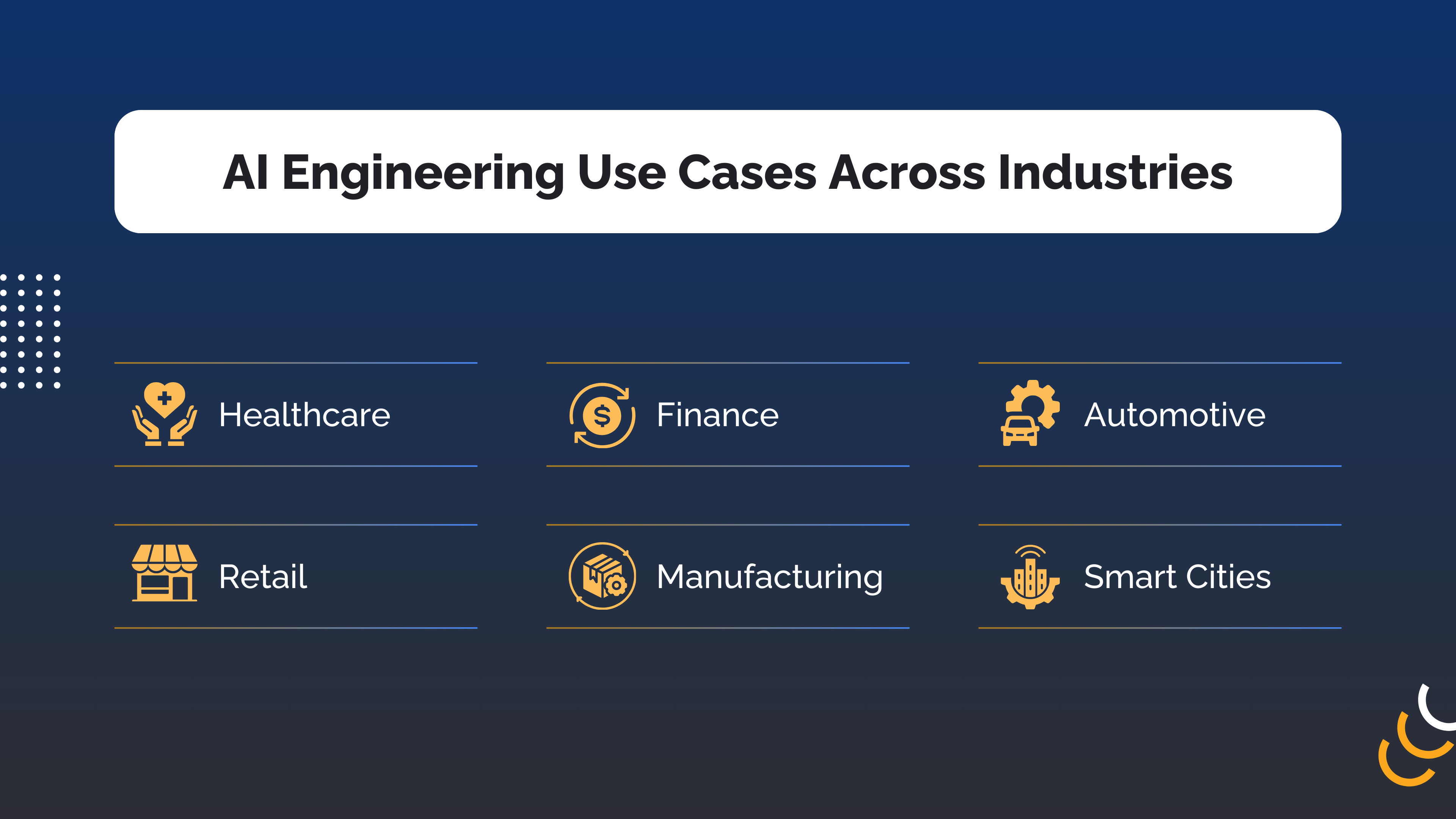
AI engineering has far-reaching implications for a variety of sectors. Here are some industries that have already integrated AI into their operations, leading to more efficient, scalable, and innovative solutions.
Healthcare
AI engineers in healthcare are developing solutions to assist in medical diagnostics, analyze medical images, and predict patient outcomes. These models enable personalized treatment plans by optimizing care based on patient data. AI is also improving operational efficiency by automating administrative tasks, allowing healthcare professionals to focus more on patient care.
Finance
AI engineering in finance encompasses several critical applications, including fraud detection through anomaly analysis, risk assessment using complex data relationships, and algorithmic trading that optimizes investment strategies. It enhances personalized banking experiences with tailored recommendations and automates regulatory compliance to ensure adherence to laws.
Automotive
AI Engineers design systems that process real-time data from sensors and cameras, helping vehicles make intelligent decisions in dynamic environments.
Retail
AI Engineers enable personalized shopping experiences by developing recommendation systems, optimizing inventory management, and enhancing customer service.
Manufacturing
AI engineering in manufacturing focuses on improving operational efficiency through AI-powered automation. For example, AI systems spot and fix production line inefficiencies in real-time, cutting costs and boosting output. Machine learning also helps optimize supply chains by analyzing inventory, predicting demand, and improving logistics, resulting in reduced waste and smoother operations.
Smart Cities
AI Engineers work on systems that manage traffic flow, optimize energy consumption, and monitor environmental factors, improving urban living through intelligent infrastructure.
Want to know how AI engineers made an impact in real life, specifically in the healthcare industry? Take geriatric care, for example. AI solutions were implemented to manage elderly patient records, automate documentation, and reduce administrative workloads. The impact was significant: a 25% reduction in time spent on CMS quality reporting, a 5% increase in daily encounter volume, and a 25% decrease in denied claims. This helped streamline operations and ultimately improved patient outcomes. To read the full case study, click here.
With the demand for AI engineers soaring, let’s explore how their role and skill set differ from traditional software development, setting them apart in today’s tech ecosystem.
Key Differences Between Software Development and AI Engineering
While software developers and AI engineers may share a common foundation in coding, the nature of their work and the skills required diverge significantly. Software development is about building reliable systems that solve specific problems using deterministic processes. In contrast, AI engineering focuses on creating systems that can learn from data, adapt over time, and make autonomous decisions.
Let’s take a closer look at the key differences in skills, problem-solving approaches, and tools that define software development and AI engineering.
Now that we understand the distinct roles of software engineers and AI engineers, here’s a step-by-step guide to help you transition smoothly into AI engineering.
What are the key steps for software engineers to transition into AI engineering?
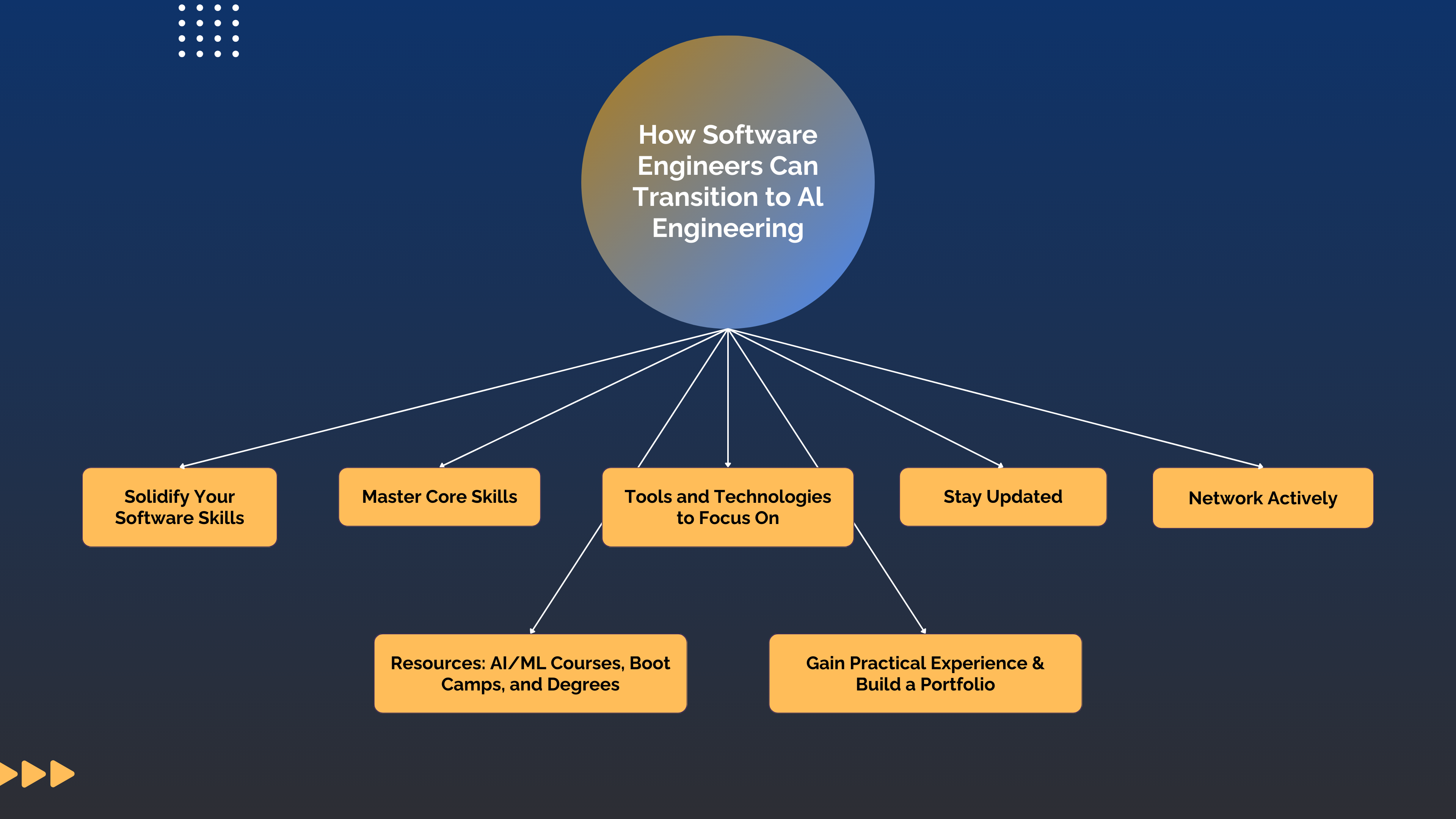
Transitioning from software development to AI engineering is an exciting journey, and the process requires both strategic learning and hands-on experience. Here are the key steps software engineers can take to make this shift.
1. Solidify Your Software Skills
As a software engineer, you already have a solid foundation in programming and problem-solving, which are crucial to AI engineering. However, transitioning to AI requires building on these skills and gaining a deeper understanding of several specialized areas.
2. Master Core Skills
To transition effectively into AI engineering, it's crucial to focus on mastering these foundational skills:
- Mathematics: Focus on essential mathematical concepts like linear algebra, probability, statistics, and calculus that are foundational for ML algorithms.
- Machine Learning (ML): Learn key ML concepts such as supervised and unsupervised learning and model evaluation techniques.
- Neural Networks: Understand different types of neural networks like CNNs (image processing) and RNNs (sequence data).
- Natural Language Processing (NLP) & Computer Vision (CV): Gain proficiency in these fast-growing AI fields that are integral to modern applications.
- Python and R: Master Python (widely used for AI development) and R (popular in data science and statistical analysis), along with their associated libraries like TensorFlow, Keras, and Scikit-learn.
3. Tools and Technologies to Focus On
Learning the right tools and frameworks is essential for hands-on AI engineering.
- Foundation Models: Get familiar with models like GPT and BERT for tasks such as text generation, classification, and sentiment analysis.
- APIs & Open-Source Models: Learn to interact with APIs and fine-tune open-source models for AI applications using platforms like Hugging Face and Google AI.
- RAG (Retrieval-Augmented Generation): Understand RAG techniques to integrate AI systems with external data sources for enhanced functionality.
- Code Generation & Automation: Use tools like GitHub Copilot and frameworks like Devon to automate coding tasks, letting you focus on solving AI-specific problems.
4. Resources: AI/ML Courses, Boot Camps, and Degrees
If you’re serious about the transition, consider investing time in specialized courses, boot camps, or even advanced degrees. Here are some top resources to expand your expertise.
5. Gain Practical Experience & Build a Portfolio
While mastering AI skills and tools is important, hands-on experience is what truly sets you apart as an AI engineer. In addition to personal projects, contributing to open-source initiatives can help build real-world experience and highlight your abilities to the community.
Engaging in personal experiments, collaborating on platforms like GitHub, or participating in forums and specialized learning communities like Reddit and YouTube will accelerate the growth. Many professionals emphasize that real learning occurs when you apply theory to practical projects.
To gain practical experience, consider the following:
- Start with smaller machine learning projects: Focus on basic concepts like supervised vs. unsupervised learning and regression models before moving on to deep learning or neural networks.
- Engage in Kaggle competitions and hackathons: These platforms simulate real-world challenges and provide a great way to test and improve your skills.
- Contribute to open-source projects: Collaborating on open-source initiatives gives you exposure to complex problems and allows you to learn from experienced engineers.
Practical application through these projects will help solidify your AI knowledge and make you a strong candidate for AI engineering roles.
6. Network Actively
Networking with AI professionals is essential for making connections, learning from others, and staying updated on industry trends. Join online AI communities, attend conferences, and connect with professionals through platforms like LinkedIn and Twitter. Participate in forums such as Stack Overflow and Reddit to engage with experts in the field.
7. Stay Updated
Staying updated is critical for maintaining a competitive edge in the tech field. Subscribe to research papers, blogs, and AI podcasts to learn about the latest trends and innovations in the field.
With AI's continuous evolution, understanding its influence on the future of software development is essential for adapting and staying ahead. Let’s explore how AI is transforming engineering roles and the way we approach software design and innovation moving forward.
The Future of AI Engineering and Software Development
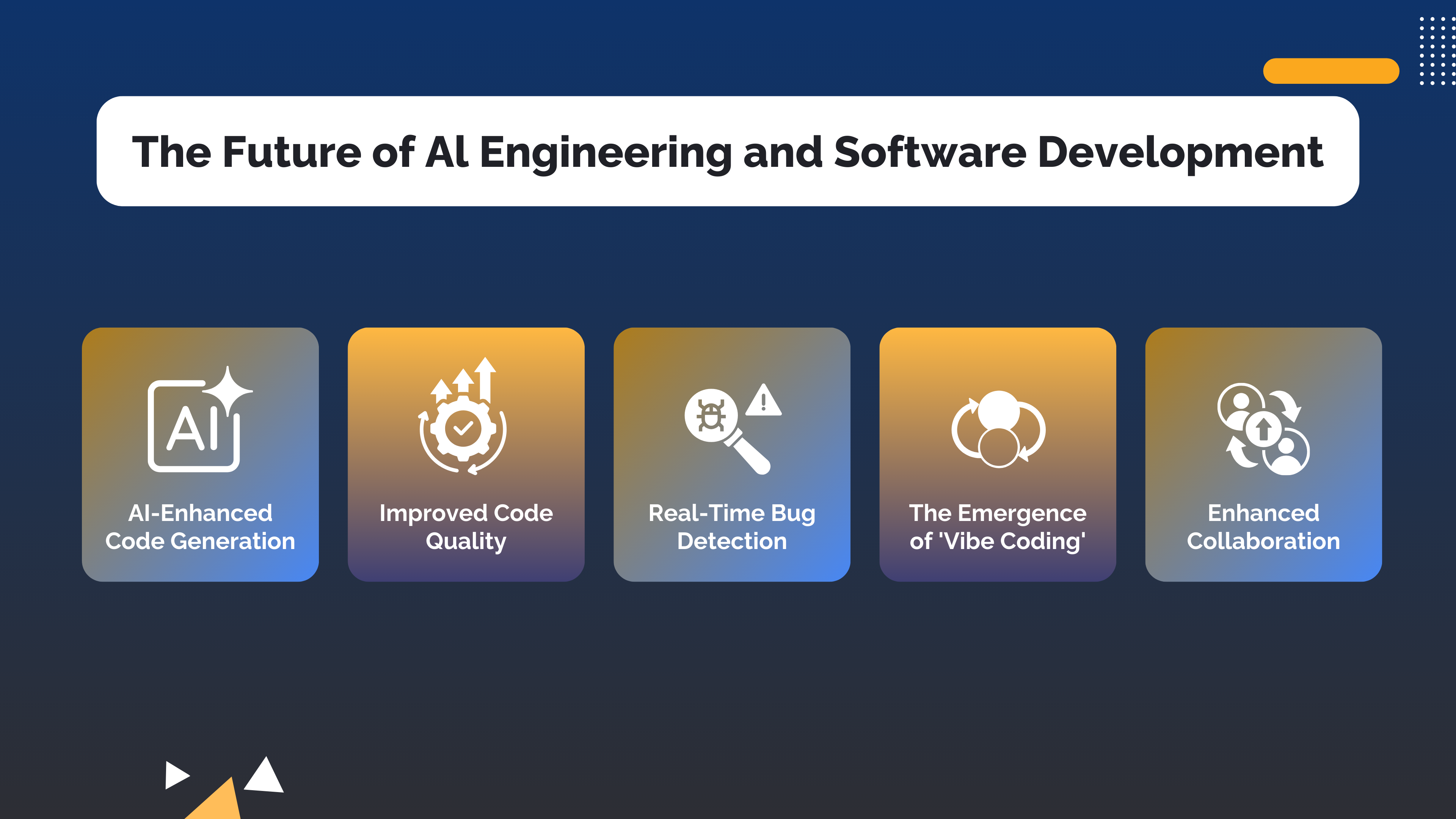
The integration of Artificial Intelligence (AI) into software development is transforming traditional practices, improving efficiency, and promoting collaboration. AI is extending its role beyond code generation, influencing project management, team collaboration, and solution design. Take a look at how AI will continue to evolve within software development and its implications for the future.
1. AI-Enhanced Code Generation
AI tools like GitHub Copilot are automating code generation, allowing developers to focus on complex problem-solving. For instance, JPMorgan Chase reported a 20% increase in developer efficiency after implementing such tools.
2. Improved Code Quality
AI tools analyze code for security flaws, performance bottlenecks, and adherence to best practices, ensuring consistent quality across projects. Systems like SonarQube and DeepCode automatically flag potential risks during the development cycle, ensuring a consistent quality level across projects. AI enables real-time feedback, helping developers catch issues before they affect the final product.
3. Real-Time Bug Detection
Machine learning models now help detect errors and vulnerabilities in real-time, speeding up debugging by prioritizing and addressing bugs within a continuous integration/continuous deployment (CI/CD) pipeline.
4. The Emergence of 'Vibe Coding'
'Vibe coding' allows developers to describe desired functionalities in natural language, and AI generates the corresponding code. While it reduces the need for in-depth programming skills, developers must still ensure that AI-generated code meets quality standards.
5. Enhanced Collaboration
AI-driven tools like TensorFlow, AutoML, and MLflow are enabling developers to integrate machine learning into their applications without requiring deep expertise in the field. This shift facilitates more collaboration across traditionally siloed roles. For example, UX designers can utilize AI insights to refine interfaces, ensuring a more user-centric approach to software development.
Evolution of AI Engineering Roles in the Next 5-10 Years
- Expanded Responsibilities: AI engineers will shift from model-building to managing AI lifecycles through MLOps pipelines (training, deployment, and monitoring) and ensuring ethical governance, including auditing models for bias and regulatory compliance. They’ll also be responsible for integrating multimodal systems (text, audio, and sensor data).
- Emerging Specializations:
- Prompt Engineers: Optimize natural language inputs for code generation tools.
- Test Architects: Design AI-driven testing frameworks for complex systems.
- AI Ethicists: Ensure fairness in automated decision-making systems.
- Skill Shifts: AI engineers will need core skills in MLOps, cloud AI platforms (like AWS SageMaker and Google Cloud AI), and LLM fine-tuning. Collaborative skills will be key to bridging gaps between data scientists, UX designers, and business leaders.
- Business Integration: By 2030, AI engineers will drive hyper-automation, creating self-healing codebases and auto-scaling infrastructures. They'll also play a critical role in decision intelligence, using real-time analytics to guide product roadmaps and strategic decisions.
In essence, the role of AI engineers will be integral to shaping the next generation of software development, driving innovation, efficiency, and personalization across industries.
Ideas2IT: Where Innovation Meets Engineering Excellence
At Ideas2IT, we believe that true innovation stems from a culture of continuous learning, problem-solving, and collaboration. As AI and software engineering continue to evolve, we view these advancements as opportunities to push boundaries rather than challenges to overcome. Our engineers not only build advanced technology but also continuously adapt and enhance their expertise in the rapidly advancing AI field.
We take pride in hosting webinars and events that help our employees stay current. For example, our recent webinar on AI-powered software engineering attracted over 100 developers, architects, and tech enthusiasts who deep-dove into the future of AI-powered software tools.
As Arun Ganesan, our Director of Technology, puts it,
“At Ideas2IT, we’re not just coding—we’re engineering the future.”
We’ve seen engineers evolve from fresh graduates into leaders who are now spearheading AI projects. We actively encourage our engineers to experiment, collaborate, and contribute to open-source projects, which in turn help drive innovative, scalable AI solutions.
Conclusion
Transitioning from software engineering to AI engineering presents a chance to evolve with a growing field that will shape the future of various industries. As AI adoption continues across sectors like healthcare, finance, manufacturing, and more, the demand for AI engineers is on the rise.
Software engineers can move seamlessly into AI engineering roles by focusing on the necessary technical skills and adopting continuous learning. This includes mastering tools like Python, TensorFlow, and PyTorch, as well as building a strong foundation in machine learning principles. The field of AI is developing quickly, but with the right focus, engineers can stay ahead of the curve.
If you’re looking to transition into AI engineering, now is the time to get started. With the right mindset and the proper tools, software engineers can make a lasting impact in this rapidly growing field. The future of AI engineering is open, and the opportunity is yours to take.







.png)
.png)
.png)
.png)
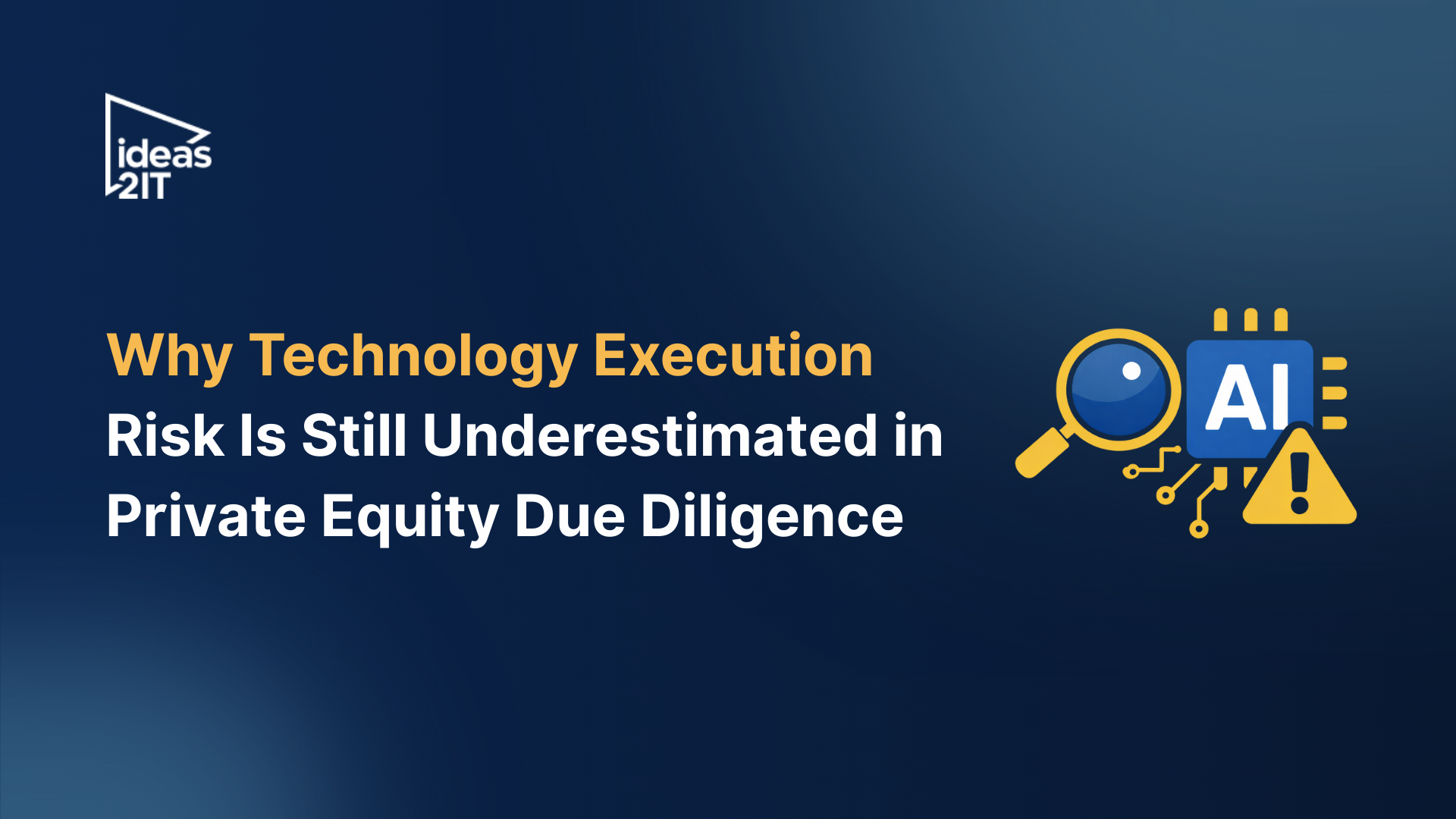
.png)





